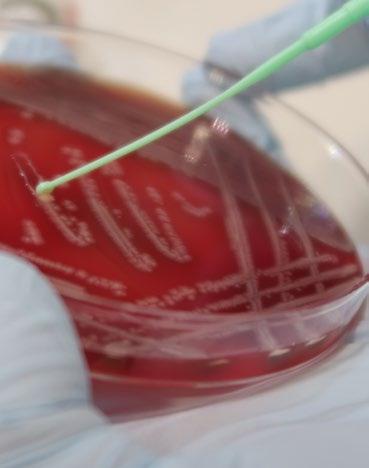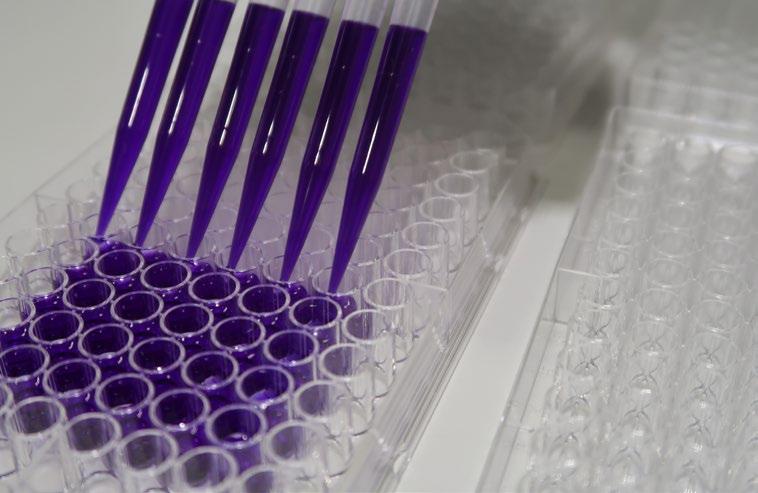Antimicrobial Resistance Initiative



Antimicrobial resistance has become a threat to public health worldwide. Microorganisms become resistant to antimicrobial agents either by mutations in specific genes or by acquisition of genes encoding resistant determinants transferred from one microorganism to another.
The use and misuse of antimicrobial agents can easily select for these resistant pathogens, increasing the prevalence of multidrugresistant (MDR) microorganisms. In 2019, there were 1.27 million deaths worldwide due to multidrug-resistant bacteria infections, with a high proportion of these deaths occuring in subSaharan countries. This number is projected to reach 10 millions by 2050 unless new policies and interventions are implemented.
A One Health approach is needed to tackle this problem, as it is not only limited to humans; antimicrobial agents are significantly used to prevent infections in the animal industry and are even used as “growth promoters” for fattening livestock in some countries, further increasing the problem of resistance.
In recent years, the number of available antimicrobial agents active against resistant microorganisms has decreased, reducing the therapeutic options available to treat infections caused by these pathogens. Although MDR microorganisms cause infections mainly in hospitals, the number of such infections in the community is increasing.
As resistance to first-line drugs emerges, infections last longer and become more expensive to treat, often requiring hospitalization. This situation increases health care costs and poses a serious threat to the progress made in global health by countries, communities and individuals in recent decades.
The World Health Organisation (WHO) warns that the world is heading for a “post-antibiotic era” unless action is taken. More resources are needed to fight the so-called superbugs and awareness of the seriousness of the problema needs to be raised.
The following specific actions need to be taken on a global scale:
· Strengthening existing systems and establish new systems in low- and middle-income countries (LMICs) to track and monitor antimicrobial resistance.
· Promote the rational use of antimicrobial agents in humans and animals.
· To improve the prevention and control of infections.
· To stimulate innovation, research and the development of both diagnostic tools and new drugs to combat resistant pathogens.
In this context, the Antimicrobial Resistance Initiative aims to contribute to the global research efforts to contain antimicrobial resistance and discover novel therapies. At the heart of the Initiative’s work model is the concept of knowledge translation: the transfer of scientific evidence into concrete action.
Globally, 480,000 people develop multi-drug resistant tuberculosis each year
Every year, 1.2 million people around the world die from infections caused by drug-resistant pathogens
The main research activities carried out by the Antimicrobial Resistance Initiative are focused on:
· Understanding the molecular basis of antimicrobial resistance and its relationship to virulence.
· New strategies for the discovery and development of new antibacterial agents.

· Design of rapid tests based on proteomic and genomic approaches for the diagnosis of infectious diseases.
· Development of information strategies for health professionals to disseminate the problem to the general public and patients.
ISGlobal participates in the following international and national projects:
· MISTRAL. European project that will contribute to the implementation of the European One Health Action Plan against Antimicrobial Resistance by thoroughly identifying the clinical and phenotypic correlates of genotypic resistance.
· AMREduCare. A European project that aims to fill the educational gaps in the field of antimicrobial resistance for clinical and non-clinical healthcare teams. ISGlobal is coordinating the module for public health professionals.
· MePRAM. A project that integrates new omics technologies in the detection and early diagnosis of multidrug-resistant microorganisms in order to optimise and personalise the clinical management and treatment of affected patients, as well as to predict the development of clinical resistance and infections caused by multidrug-resistant microorganisms.
ISGlobal is part of an Interdisciplinary International Research Partnership (IRP) to address antimicrobial resistance as an emerging global health threat. The aim of this working group is to develop and implement interventions in LMICs in order to generate reliable data on antimicrobial resistance.
In this context, the Initiative is working on mapping resistance in sub-Saharan Africa, one of the regions where information on this phenomenon is scarce. The aim is to collect data on the main challenges in the access and use of antibiotics in low-income countries. In parallel,
a rapid, simple and inexpensive diagnostic test is being developed to diagnose pneumonia in children under five in low- and middle-income countries.
In addition, ISGlobal has been driving a knowledge network in the Mediterranean region, including the creation of a health observatory with antimicrobial resistance as one of its priorities.

Training of health professionals and the general public, both locally and internationally, is a key component of the Initiative’s work.
Past and planned activities include:
· An international summer school on the challenges of antimicrobial resistance.
· Digital training course for secondary school teachers.

· ESCOLAB workshops for ESO, high school and vocational training students.
· Workshops and production of awarenessraising resources for the general public with students from the Université Abulcassis in Rabat, Morocco, as part of the SAFE programme.
· Workshops on science and citizen participation in ethnobotany, art and antimicrobial resistance (ENDEMIC programme).
In addition, the Initiative participates in many local and international science dissemination events through workshops aimed at children and adolescents using non-formal methods.
Source: www.reactgroup.org
1953
Glycopeptides, Nitroimidazoles, Streptogramins
1952
Macrolides 1950
Pleuromutilins 1948
Cephalosporins 1947
Polymyxins, Phenicols 1946
Nitrofurans
1945
Tetracyclines
1943
Aminoglycosides, Bacitracin (topical)
1932
Sulfonamides
1928
Penicillins
1955
Cycloserine, Novobiocin
1957
Rifamycins
1961
Trimethoprim
1962
Quinolones, Lincosamides, Fusidic acid
1969
Fosfomycin
1971
Mupirocin
1976
Carbapenems
1978
Oxazolidinones
1979
Monobactams
1987
Lipopeptides
Only 1 new class of antibiotic has been discovered in the last 36 years
Antimicrobial resistance threatens the effective prevention and treatment of an everincreasing range of infections
www.isglobal.org
ISGlobal’s mission is to promote health equity through excellence in research and the translation and application of knowledge. Our vision is a world in which all people can enjoy good health.
ISGlobal Initiatives
· Antibiotic Resistance Inititative
· Chagas Inititiative
· Malaria Elimination Initiative
· Maternal, Child and Reproductive Health Initiative
· Urban Planning, Environment and Health Initiative
A partnership of: